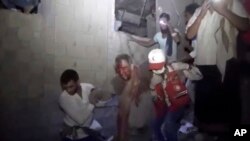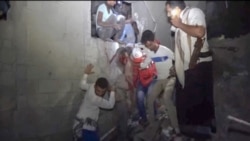The United Nations and international aid organizations have expressed concern and outrage over Saudi-led coalition airstrikes in Yemen Friday that killed at least 70 people and knocked out the country’s internet.
The early morning strike hit at a temporary holding facility in the northwestern city of Sa’ada, with mostly migrants, including women and children, among those killed and wounded.
The Saudi-led coalition said in a statement Saturday that the Houthis, who control northern Yemen, had not alerted the United Nations and the International Committee of the Red Cross that the site should be on a list of targets that should be avoided.
Doctors Without Borders’ Yemen director, Ahmed Mahat, said around 200 of the injured were taken to a local hospital and his team in Sa’ada said many bodies remain beneath the rubble.
“It is impossible to know how many people have been killed. It seems to have been a horrific act of violence,” Mahat said in a statement.
The International Committee of the Red Cross said at least 100 people were killed and injured.
“It is essential that we protect the lives of people in armed conflict. The human toll that we witness in Yemen is unacceptable,” Fabrizio Carboni, ICRC’s regional director for the Near and Middle East, said in a statement.
Airstrike at Hodeidah
In a separate airstrike in Yemen, three children were killed while playing in a football field in Hodeidah city, according to aid group Save the Children. At least five adults were also injured.
Coalition airstrikes on Hodeidah also damaged the country’s main telecommunications center and knocked out the internet nationwide.
The U.N. mission in Yemen said it is “gravely concerned” about recent military hostilities in the city that have killed and injured civilians and damaged public infrastructure.
“The consequences of continued military confrontation in Hodeidah could be catastrophic for Yemenis, given the importance of the Hodeidah ports, which remain a critical lifeline for the population,” the U.N. mission said.
Yemen is reliant on imports for nearly all its food and fuel, most of which come through Hodeidah’s Red Sea port.
Both Hodeidah and Sa’ada are controlled by Iranian-backed Houthi rebels, whom the ousted Yemeni government has been fighting with assistance from a Saudi-led coalition since March 2015.
Reprisals
The Saudi-led coalition has stepped up airstrikes since Monday’s Houthi-claimed drone attack on Abu Dhabi, the capital of the United Arab Emirates. Three civilian workers — two Indians and a Pakistani — were killed and six others injured in the brazen daytime strike.
U.N. Secretary-General Antonio Guterres condemned both the airstrikes and the Houthi attack on the UAE during a news conference on Friday.
“This escalation needs to stop,” he told reporters at the United Nations.
He reiterated his calls for the parties to implement a cease-fire, open the ports and airports, and then begin a serious dialogue.
News of the latest airstrikes and casualties came as the U.N. Security Council met privately Friday morning in New York at the request of the UAE. The council issued a statement condemning the Houthi attack and calling for accountability for the perpetrators.
UAE envoy Lana Nusseibeh told reporters that she shared information on the attacks with her Security Council counterparts.
'Launched indiscriminately'
“The details, the origins of these attacks in Yemen, and where they were targeted to in Abu Dhabi, shows clearly that Sana’a, amongst other places of origin, were the place that these missiles — cruise missiles, ballistic missiles and drones — were launched indiscriminately at my country, in order to target the maximum number of civilians and civilian infrastructure,” she said.
Yemen’s capital, Sana’a, has also seen heavy airstrikes in recent days.
Among the Houthi’s targets in Abu Dhabi was the international airport, which Nusseibeh said sees more than 60,000 passengers transit on a daily basis.
“This terrorist attack threatened the lives not only of my fellow Emiratis, but of the citizens of every U.N. member state, as well as all the residents of the UAE,” Nusseibeh said. “It is essential that the Security Council and the international community hold this terrorist Houthi militia to account for these crimes and to prevent future atrocities.”





